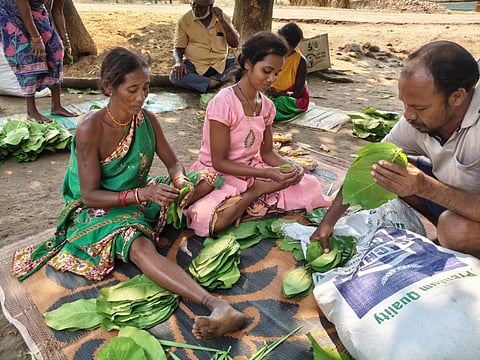

More than 100 Gram Sabhas in southern Odisha have joined forces to sell kendu leaves directly, leveraging their community forest rights in a move that empowers local communities while disrupting traditional middleman structures.
Kendu leaves, also known as tendu leaves in some parts of the country, are used to roll tobacco into beedis (local cigarettes) and possess a number of medicinal properties. The non-timber forest product (NTFP), which provides a vital source of income for tribal communities in the region, is commonly known as “green gold” in the state.
The 103 Gram Sabhas in the Baipariguda block of Koraput district have decided to exercise their Community Forest Rights, which allow them to use forest products for their livelihood.
The traditional system included layers of middlemen who would frequently buy the leaves at a lower price. The leaves would be picked up less frequently, and some areas would be overlooked.
To address this issue, Gram Sabhas formed the Baipariguda Gram Sabha Maha Sangha, which has the authority to issue transit permits to traders for the transportation of kendu leaves.
Bidyut Mohanty, secretary of SPREAD, a nonprofit that advocates for tribal rights in the region, said the villagers had filed requisitions under the Forest Rights Act to claim Community Forest Rights, which allow them to collect and market forest products.
Bhaktaram Majhi, a resident of Kalathjodi village, explained that the villagers used to sell their produce to a forest department-appointed trader. “We earned just Rs 3.2 per bundle. Another issue we faced was that the produce wasn’t picked up from us regularly, which didn’t guarantee a stable income,” he said.
Under the new initiative, the villagers earn Rs 4 per bundle.
Majhi also stated that, despite requests, the traders frequently failed to collect from all areas. “They do not collect from all areas because their quota is met and they no longer require kendu leaves. But for us, regular collection is crucial for stable income,” he explained.
As a result, the villagers reached an agreement and unanimously passed a resolution to bridge the gap and ensure the collection of kendu leaves from areas where the forest department or traders fail to extract them.
This move has directly benefited 6,000 people in these villages.
Dola Govind Philo of Kalyajodi village said he used to earn Rs 5,000 to 10,000 per month from selling kendu leaves. “But with the better rates offered by the Gram Sabha, my income has increased to between Rs 10,000 and Rs 15,000 per month,” he stated.
Sukra Krisani, secretary of the Gram Sabha Maha Sangha, said the communities have set the objective of collecting at least seven lakh bundles of kendu leaves within two weeks.
“This amount will bring in a lot of money for the block's underprivileged tribes. These Gram Sabhas intend to process and package the leaves to market them and form alliances with traders both within and outside Odisha,” she explained.
Krisani added that working together would increase the villagers’ income capacity and enhance the overall well-being of the community.